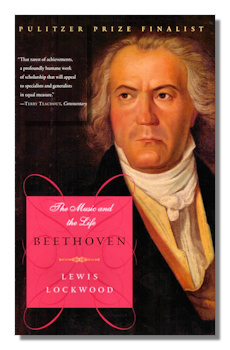
The Internet's Premier Classical Music Source
Related Links
-
Introduction
Acoustics
Ballet
Biographies
Chamber Music
Composers & Composition
Conducting
Criticism & Commentary
Discographies & CD Guides
Fiction
History
Humor
Illustrations & Photos
Instrumental
Lieder
Music Appreciation
Music Education
Music Industry
Music and the Mind
Opera
Orchestration
Reference Works
Scores
Thematic Indices
Theory & Analysis
Vocal Technique
Search Amazon
Recommended Links
Site News
 Book Review
Book Review
Beethoven

The Music and the Life
Lewis Lockwood
W.W. Norton & Company. 2002. 604 pages
ISBN-10: 0393050815
ISBN-13: 978-0393050813
Note the word order in the subtitle. This excellent book is about Beethoven's music and Beethoven the composer. Chapters alternate between life and works in chronological order but over two thirds of the book concerns the music, its composition and its analysis.
Compared to other biographies there is relatively little about Beethoven's non-musical concerns or activities. For instance, there is a five page section entitled "Relations with Women," but, just to cite one comparison, a biography of Beethoven published a generation ago by George R. Marek has a chapter, "The Women in Beethoven's Life" which runs nearly a hundred pages. Lockwood's accounts of Beethoven's concern for his nephew Karl are brief also; one does learn that even Beethoven's obsession with Karl, and Karl's attempted suicide a few months before Ludwig's own death, did not destroy Beethoven's ability to continue concentrated work on one of his final quartets. Beethoven's deafness is of course discussed, but there is next to nothing about his final illness and death.
Interesting details of Beethoven's life that Lockwood does provide succinct information about include a significant amount about his dealings with the young Archduke Rudolph, Beethoven's only composition student (some of whose works are available on recordings) and most faithful patron. If, from other accounts, one has difficulty distinguishing Schindler from Schuppanzigh, this account will make them come more to life. Also, Beethoven's early years in Bonn when, by default, he was in effect head and support of his family, are interestingly described.
There is no skimping when it comes to the music. Lockwood, the Fanny Peabody Research Professor of Music at Harvard, who previously published Beethoven: Studies in the Creative Process and was co-editor of Beethoven Essays: Studies in Honor of Eliot Forbes and as co-editor of Essays in Musicology is intimately familiar with Beethoven's sketch books and other manuscripts and is eminently qualified to discuss this music. As it happens, he writes clearly and well, so that it can be read profitably by a wide range of readers, from the serious concert-goer to the musicologist. It does help to have at least a rudimentary understanding of musical theory, particularly about key relationships, but it is not necessary that the reader be able to read music, as he includes very few lines of score, and those in Beethoven's own hand. One might compare, for instance, the several pages of Lockwood's prose concerning the Hammerklavier Sonata with the long section in Charles Rosen's The Classical Style, the bulk of which is quotation of score passages.
Lockwood emphasizes the works he considers important inherently or innovatively. He has high regard for the even-numbered symphonies, especially two and eight, which are too often slighted by others. He refers often to the first Razumovsky Quartet, Op. 59, no. 1, in addition to discussing it in detail. He gives ten pages to the Missa Solemnis, twenty to the Ninth Symphony, and nearly fifty to the last quartets.
One practice some readers may find annoying is that although he refers to the symphonies and piano concertos by number, he identifies the sonatas and quartets only by opus numbers and key. A satisfying bit of information, though, is that the works identifiable by WoO numbers (which conveniently designate, in both German and English, works without opus numbers) are not simply early unpublished works from Beethoven's Bonn years but works written throughout Beethoven's career that were intended for purchase by amateurs but which the composer did not wish to list as significant works.
One very interesting section of his book, which particularly illustrates the currentness of Lockwood's scholarship, is Chapter 18, "Bringing the Past into the Present," which gives an account of Beethoven's knowledge of Bach and Handel and his great interest in the fugue. Beethoven wrote a number of fugal movements, strikingly in the Hammerklavier Sonata and the C# Minor Quartet, as anyone familiar with them knows, but it long was said that Bach was virtually unknown and forgotten in the classical period. Lockwood mentions that even Mozart was influenced by Bach.
A professor I once knew remarked about book reviews that if the worst thing the reviewer could say is that on page 415, say, there is an error of fact, then you can be sure that a really good book is at hand. The one mistake I find in this book is that Lockwood gets the French Revolution of 1830 wrong – and since this was after Beethoven's death and unconnected to him he need not even have mentioned it. This is a terrific book.
Appendices include a chronology, a bibliography, a classified index of Beethoven's works, an index of his works by opus number, as well as a general index.
Copyright © 2009 by R. James Tobin.


















